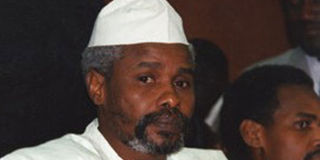Victims of Habre’s atrocities tell their story as ex-leader adamant

Photo/FILE
Former Chad president Hissene Habre.
NDJAMENA, Wednesday
Arrests, disappearances, torture and murder: past atrocities have brought together some of the victims of the repressive 1982-1990 rule in Chad of Hissene Habre, who is accused of crimes against humanity.
Ms Fatima Mando was arrested at her job in Ndjamena in 1983 with three other women by para-military gendarmes who accused them of taking part in a pro-rebellion demonstration.
She was among the victims of Habre’s iron-fisted rule who told their stories at the weekend.
“To make us talk, make us confess, there were beatings, they hit us hard. They forced us to undress. I said, ‘I won’t undress.’
“But they tore my clothes off...Fortunately, we were only there for 10 days,” Mando said. She thinks she owes her release to the intervention of her superior at work.
“My husband is the only victim among the 40,000 (the estimated number of those who died in detention according to a 1992 commission of inquiry) whose body was returned,” said Zenaba Galyam, widow of one of Habre’s top aides who was arrested in 1983 by two of “his own friends” and “died on April 22, 1984 in the (military) martyrs’ camps.”
“I was taken in on May 11, 1989,” said Jean Noyoma Kouvounsouna, who was 28 at the time, when he was interrogated for “three days.”
“I was tied up and water under pressure was poured down my mouth to force me to say that I was an agent of Libya in Chad,” he said.
Chad was at war with the neighbouring Libya of Colonel Muammar Gaddafi in the 1980s. Transferred to the martyrs’ camps, Mr Kouvounsouna spent “seven months and six weeks (inside).
There were six of us in cells of 1 metre 50 by two metres.” “We were so cramped that in order for me to turn round, everybody else had to turn round.
“After I lay down, I gave up my place to somebody else, and he rested for a while, then when I was tired he got up and I took his place,” said Clement Abaifouta, who was arrested on July 12, 1985 in NDjamena and held in various detention centres for almost four years.
Abaifouta was forced to be a gravedigger, who at one stage buried between eight and ten bodies on average. His jailor called the bodies “bags”.
“We struggled to find out why we were being subjected to such treatment,” he said, but he and his fellow sufferers got no real answers.
On August 13, 1984, troops of a crack army unit arrived to pick up the older brother of Pierre Ngolsou, then a schoolboy, and a friend who allegedly hid an opposition figure in neighbouring Nigeria.
“As of now, just up to today, we don’t know what became of those two people,” Mr Ngolsou said.
Antoinette Mandjere was 42 and living in Sarh in the south in September 1984 when her younger brother disappeared. His body was found a few days later, left out in the bush.
“They didn’t bury the dead, they let the bodies rot.” Villagers helped her discreetly to bury him. She does not know why he was executed.
But Mandjere was in turn led to the local police chief, beaten with branches and finally released thanks to the district administrator. If he had not intervened, “they were going to tie me up to throw me in the Chari” river, she told AFP.
Ginette Ngarbaye was picked up in 1985 in Ndjamena by a man who said he had found a missing aunt of hers but instead led her to the security police. She was greeted by “a large, fat man whose shirt was stained with blood.”
When the announcent that he would be expelled, Habre had reacted with “astonishment and surprise” to the Senegalese government’s decision to send him back to the country he once ruled, said El Hadji Diouf, one of his Senegalese lawyers.
“He himself used the term kidnapping,” Mr Diouf told reporters. “This is neither an expulsion, nor an extradition, it’s a hostage-taking.”
Mr Habre’s defence tem was preparing to file complaint for human rights violations against Senegalese President Abdoulaye Wade both in Senegal and internationally, he added.
If anything happened to Habre after he was flown back to Chad on Monday, President Wade would be sued for complicity in murder and acts of torture, Diouf said. (AFP)




